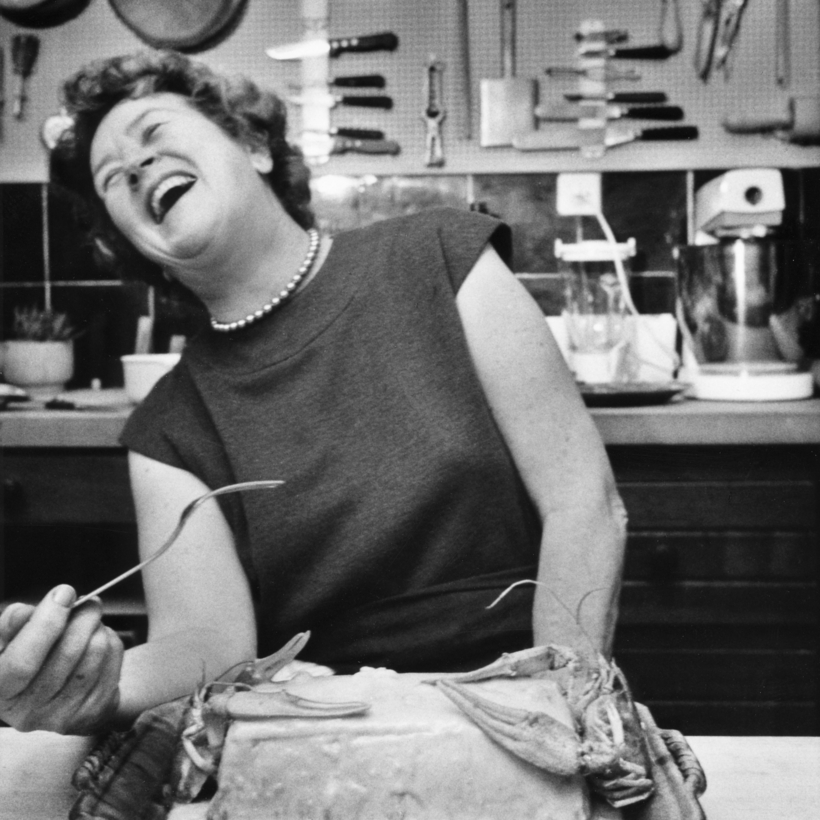Even observed from the front door of Chez Georges in Paris, looking through the long narrow dining room with low amber lighting, the square-shouldered, lantern-jawed woman sitting alone on a banquette at a corner table had a self-possessed public posture that was familiar to me.
She could have been one of my aunts, gracious but firm, warm but wary, hospitable but assessing, and supremely sure of her place in the world. She would probably be a little aloof, too, because, as my Bostonian grandmother advised her daughters, “when you’re not sure about someone, be civil but strange.”
This social certainty was transmitted by small, well-practiced, slightly theatrical gestures—a cocked head to indicate interest and attention, a smile with no teeth exposed to politely create distance, and a whole catalogue of differently calibrated nods that ranged from mirthful naughtiness to the exasperation building just before a raised eyebrow.
“When you’re not sure about someone, be civil but strange.”
Oddly, I had a feeling I’d seen her somewhere before. Once I’d seated myself in the chair the waiter drew back from the table in front of her, it dawned on me with a panicking thud. The woman in front of me with an unfathomable expression on her face was Julia Child. That Julia Child.
“So you’re one of Gregory’s friends,” she said, referring to Gregory Usher, the American from Oregon who’d founded the École Ritz Escoffier. Out of the blue, Usher had invited me to this dinner after reading an article I’d written about French cheese. Child’s question implied she assumed I was gay, which wrong-footed me as someone who was habitually reserved about personal things and established that she would dominate our conversation.
What followed was the sort of polite and cautious small talk with a stranger we’d both been taught as children, but which, I’d soon discover, we both loathed. We answered each other’s questions as we gulped a superb Chablis, lemony and bursting with minerals. I was from Connecticut and Julia from California. Julia had gone to Smith, and I to Amherst.

We had a lot in common, which is why we eventually arrived at a squirming moment of awkward intimacy when I think we recognized ourselves in each other, her deficient femininity and my wanting masculinity. This caused us to momentarily avert our eyes from each other, and then we looked at each other and chuckled. Then she waved down the waiter for another bottle of wine and made me a canapé of chicken-liver pâté from the little pot on the table in front of us.
Watching her deftly smear a tidy mound of brown paste on a round of toast, I was thinking that the power of what we’d perceived about each other meant we could either become very good friends or harm each other with lethal accuracy when the rest of the table arrived. Julia handed me the canapé with a smile with no exposed teeth, as she instantly recomposed herself. I immediately understood that we would now re-assume the selves we’d been a half-hour earlier, before a bottle of wine and our conversation.
During the meal, a sumptuous suite of dishes ordered by Child and Usher, including the first salmon in sorrel sauce I’d ever had (a brilliant preparation that tasted like putting a copper penny under your tongue and taking a swig of seawater), I found myself wondering why this very intelligent woman had chosen such an unlikely career in cooking. Both of us came from families where wholesome food was glancingly acknowledged, mainly as a necessity for good health. Unless I’d missed something, she didn’t strike me as someone who would instinctively care all that much about what she ate.
We recognized ourselves in each other, her deficient femininity and my wanting masculinity.
The next time I went to Chez Georges, they remembered me, because they’d seen me dining with the Queen. Child loved the restaurant, and the restaurant respected the tall, gangly American lady in return, because she offered it up as a stock answer to what she once described to me as the most tediously recurring question in her whole life: What is your favorite restaurant in Paris?
That night, the waiter asked me if I might be going to America anytime soon. When I said I was, he handed me a book. “Perhaps you could return this to Mrs. Child? She left it behind on the banquette the other night.” I said I would.
It was a John MacDonald mystery from the Cambridge Public Library with a 10-cents-off coupon for Land O’Lakes butter and several sheets of ruled paper torn from a notepad inside the back cover. On one of them: “What would you like for dinner tonight, my love?” And below, a plump, carefully drawn heart with an arrow stuck through it and a single word: “You!”
The conversation of what had probably been a note she’d left for her husband, Paul, on the door of their refrigerator, continued:
“But what DO you want for dinner? And WHY do you want me?”
“Some salmon would be nice. And because you’re such a wonderful cook!”
I read Julia Child’s shopping list—salmon, lemons, parsley, chervil (if they have), shallots, butter, cream, new potatoes, lettuce. Chablis.
And I felt rather stupid.
Alexander Lobrano is a writer and restaurant critic based in Paris. His latest book, the gastronomic coming-of-age story My Place at the Table, is out now


